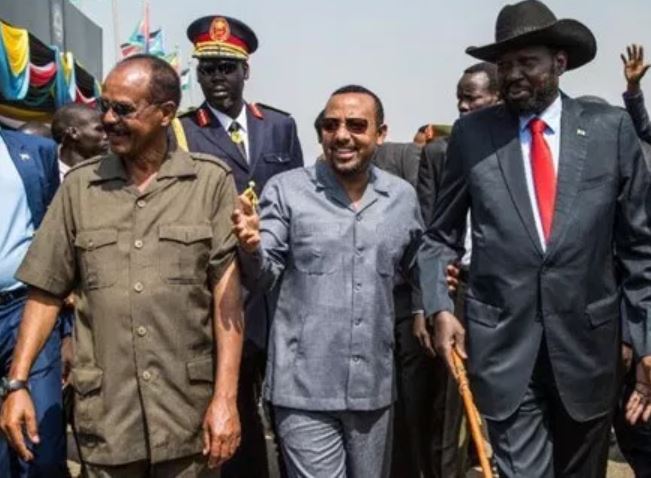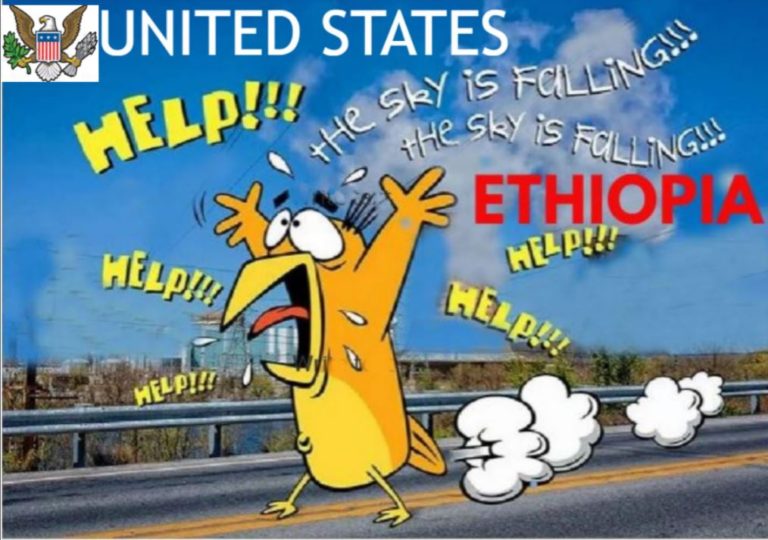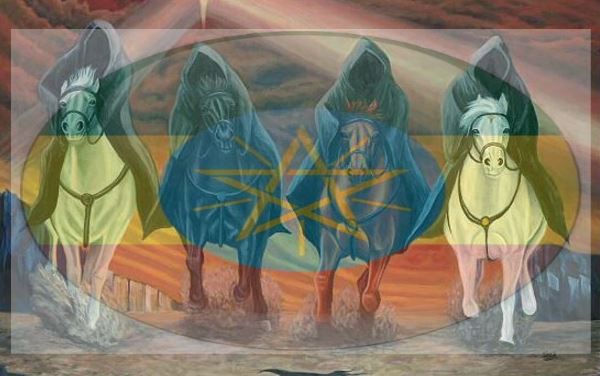The Praxis of Medemer in the Horn of Africa
 Praxis is simply the practical application of theory.
Praxis is simply the practical application of theory.
In praxis, one is not interested in trying to understand the world in the abstract but to act in the world in order to change it and make it better.
Last week, H.E. Prime Minister Dr. Abiy Ahmed was doing whirlwind shuttle diplomacy demonstrating the praxis of his Medemer “theory” to the distressing, tragic and often aggravating politics of the Horn of Africa.
On March 1, PM Abiy hosted President Uhuru Kenyatta, who brought with him as many as 100 Kenyan government authorities, corporate and business community representatives, to discuss a range of economic and investment issues.
On March 3, PM Abiy and President Uhuru flew to Asmara to meet President Isaias for trilateral discussions on regional economic integration.
On March 4, PM Abiy and President Isaias were in Juba, South Sudan to discuss “regional peace, economic ties and infrastructure development”.
On March 5, Somali president Mohamed Abdullahi Mohamed “Farmajo” arrived in Ethiopia for bilateral talks.
On March 6, PM Abiy was in Nairobi mediating a maritime border issue on the Indian Ocean between Kenya and Somalia.
All I have to say is, “Henry Kissinger, king of shuttle diplomacy, eat your heart out!”
I have previously discussed in detail what “Medemer” means to me and its practical implications.
Broadly stated, “Medemer” consists of specific political practices to determine the collective destiny of a given people.
Dr. Martin Luther King, Jr. often said, “We must all learn to live together as brothers or we will all perish together as fools.”
“Medemer”, to me, is the road map out of the wilderness of the Valley of Fools in the Horn of Africa where we have lived for centuries as enemies hellbent on destroying each other.
PM Abiy’s Medemer in the Horn of Africa has a clear and unmistakable message and resonates the truth of MLK’s words:
We have great issues facing us today in the Horn of Africa. No individual can live alone; no nation can live alone. We are tied together in the Horn of Africa in a single garment of destiny, caught in an inescapable network of mutuality. And whatever affects one Horn country directly affects all indirectly.
The Horn of Africa today faces myriad issues ranging from grinding poverty, disease and ignorance to large scale population displacements (and population explosion) and endless strings of deadly conflicts.
What happens in each Horn country affects the others. War in one country threatens the peace in the other. Peace and democracy in one country becomes an example of good governance for others.
But for decades, Horn countries (Ethiopia, Eritrea, Somalia, Kenya, Djbouti, South Sudan and Uganda) have chosen the path of perishing as fools.
Ethiopia and Eritrea fought a needless war in the name of “national pride” and “territorial integrity” between 1998-2000, which resulted in the deaths of as many as 100,000 people, displacement of up to one million and diversion of much needed resources to buy bullets instead of butter.
In July 2016, a “general” of the now defunct regime in Ethiopia openly advocated waging war against Eritrea for the purpose of regime change.
Not long ago, Sudan built up its troop presence on its eastern border with Eritrea on the pretext of potential conflict in the Red Sea.
Over the past several decades, Ethiopia and Somalia have had three full blown wars and numerous border clashes in which untold numbers of civilians were killed and displaced.
Somalia and Kenya have had low intensity conflict for decades. Last month, Kenya broke diplomatic relations with Somalia over off-shore gas and oil disputes.
There have been recent tensions between Eritrea and Djbouti.
And history continues to repeat itself in the Horn endlessly.
Since the creation of South Sudan in July 2011, President Salva Kiir and former Vice President Riek Machar have manifestly decided not to live as brothers but perish as fools.
In 2013, a power struggle between President Kiir and Mr. Machar turned into armed conflict as Kiir accused Machar of plotting a coup.
The two leaders mobilized their ethnic bases and South Sudan was headed to hell in a handbasket. Thousands died and thousands more were displaced.
A peace agreement was reached in 2015 but it did not last as conflict flared in July 2016 and Machar was forced to flee the country. South Sudan was again in the grips of civil strife and the suffering of the people continued.
In September 2018, Kiir and Machar signed a 128-page peace agreement with the aim of creating a “revitalized transitional government of national unity” and conduct new elections, among other things.
When Machar returned to South Sudan in November 2018, Kiir said he had forgiven Machar and was ready to start fresh. “I want to reiterate that the war in South Sudan has come to an end. To forgive is not an act of cowardice. It is a Christian obligation.”
There is no guarantee the tenuous peace between Kiir and Machar will hold. Thus, the peacemaking mission of PM Abiy and President Isaias.
Medemer or “the need to advance the cause of regional integration”
PM Abiy and President Isaias received a warm reception in Juba.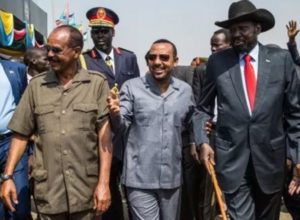
Regional integration is another phrase for “Medemer”.
PM Abiy’s office announced discussions with President Kiir will focus on “regional peace, economic ties and infrastructure development. In addition they will also be addressing issues of developing joint capacities and working together in an integrated manner.”
South Sudan’s foreign affairs minister Nhial Deng Nhial acknowledged the constructive role of the Ethiopian and Eritrean leaders and assured his government is “committed to pushing for the smooth implementation of the peace agreement.”
In a Joint Statement, the three leaders declared their discussions “focused on the need to advance the cause of regional integration” and “agreed to work out the common projects that will facilitate the attainment o of the goal of Regional Economic integration and shared prosperity.
I read the Joint Statement to mean the following:
The root and true cause of the political crises in South Sudan is not ethnic conflict or individual power struggle. The root cause is poverty. Poverty is an enemy no single country in the Horn can defeat on its own. There must be concerted effort by the countries in the region to uplift their people from poverty. In order to replace poverty with prosperity, there must be peace in each country in the Horn. Peace breeds prosperity; poverty breeds war.
Could South Sudanese faction leaders learn from PM Abiy and President Isaias?
In my view, the people of Ethiopia and Eritrea have never been enemies.
Neither do I believe the ordinary Dinkas and Nuers in South Sudan are enemies.
The problem of conflict is with the leaders and not the ordinary people.
I offer a simple thought experiment: If the people of Ethiopia and Eritrea were enemies, how can anyone explain the profusion of love, brotherhood and sisterhood we saw in Asmara and Addis Ababa when peace was declared and the two leaders visited each other’s capital?
Leaders may have differences and march their armies into war, but the people are never given a choice to decline peace and wage war.
For the past two decades, the drumbeat by the regime in Ethiopia was that Eritrea is the enemy. The Eritrean government responded in kind.
Both countries deployed troops on their borders pointing and occasionally firing their guns on each other’s position. For two decades, the leaders of the two countries conducted a war of words.
All that changed when PM Abiy took office in April 2018 and announced to the House of People’s Representatives that he will seek peace with Eritrea and finally settle the border issue as decided by international arbitration. That resulted in PM Abiy’s historic trip to Eritrea in July 2018, which was followed by President Isaias’ historic trip to Addis Ababa.
When the border crossings between Ethiopia and Eritrea were opened on September 11, 2018, I was present as a witness to history.
When I visited Ethiopia after 48 years, the last thing I expected was to be present in person at the border when Ethiopia and Eritrea opened their borders for the first time in two decades and let the dammed love flow once again.
It was a prophetic moment.
By opening their borders, the two leaders made a commitment in full view of the world that they shall hereafter “beat their swords into plowshares, and their spears into pruning hooks: nation shall not lift up sword against nation, neither shall they learn war anymore.”
I hope to write about that intense moment when I became a witness to history someday. It was one of the defining moments in my life.
I was present in Bure, a forbidding desert where some of the fiercest battles took place during the Ethio-Eritrean war. As I stood looking over the barren moonscape, I tried to imagine the thousands who lost their lives.
And for what? How true the saying, “War is hell!”
I was present in Zalambessa, once a bustling border town reduced to a heap of rubble during the war.
I wondered if the wounded hearts of the survivors of Zalambessa would begin to heal now that they are allowed to have peace in a no war, no peace zone for the first time in 20 years.
I witnessed Eritreans and Ethiopians welcoming each other at the borders with tears of joy and ululation. I am confidently optimistic the best days of Ethiopia and Eritrea are yet to come.
The million dollar question is whether South Sudanese factions can learn from the peace and reconciliation process between Ethiopia and Eritrea and get their house in order.
Frankly, is there anyone better than PM Abiy and President Isaias to teach, preach and demonstrate in practice that it is perfectly possible to have peace and reconciliation among “enemies”?
The lesson for the South Sudanese leaders may lie in replicating the techniques and following in the footsteps and roadmap of PM Abiy and President Isaias.
How did PM Abiy and President Isaias manage to tear down the wall that had separated them for decades and build a bridge in just a few weeks that brought them together?
I am sure the two leaders will one day tell us how they did the impossible.
But in my speculative view, the two leaders were able to tear down the wall on their borders and replace it with bridges because they:
Took joint and full responsibility for the mistakes of the past without pointing fingers at each other. That is why we did not hear words of recrimination and accusation about who is more culpable than the other. They both owned up to the mistakes of the past.
Decided to look at the future if their countries through the lens of peace and reconciliation rather that their old dark glasses of war.
Came to an existential realization that their peoples are inescapably connected by birth, marriage, religion, culture and language and are bound in a single garment of destiny.
Shared a common vision for the future of their two countries and decided to overcome the burden of the past by embracing a new future of interdependence.
Were willing to take a chance for peace and avoid risking war.
Understood they are not enemies of each other, but face three deadly common enemies named poverty, disease and ignorance. Every day they fight with each other, they assure total victory for their deadly enemies.
Realized economic integration and interdependence are the only options for then to have a better and prosperous future. Peace and prosperity go hand in hand. Conflict, war and poverty will only result in misery.
Realized trust, good will, patience, integrity, giving each other the benefit of the doubt, avoiding tit-for-tat retaliation, keeping the channels of communication open are decisive in peace-building.
Understood Mandela’s maxim, “If you want to make peace with your enemy, you have to work with your enemy. Then he becomes your partner.”
Understood their people desperately need butter not bullets!
The future of Africa hangs in balance on the Horn
I hear some empty barrels criticizing PM Abiy for not “staying home and solve problems instead of trying to help neighbors solve their problems.”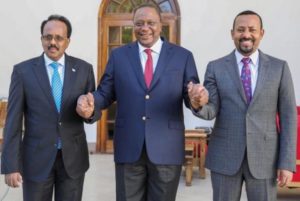
I pity these benighted cry babies who cannot see beyond their noses.
These bellyachers fail to understand that not only the future of Ethiopia but the future of Africa hangs in the balance in the Horn.
As goes the Horn of Africa, so goes the rest of Africa.
The Horn is the laboratory, the proving grounds, for all of Africa. Will there be endless wars and conflicts that will bury the continent in the abyss of poverty? Are we on the cusp of a new era of collective prosperity and progress that will ensure Africa’s rightful place on the international stage?
If the Horn countries are able to come together (Medemer), make peace and build the foundation for peaceful and prosperous relations, the rest of Africa will follow in their footsteps.
The September 2018 South Sudan agreement is essentially about peace and reconciliation. Chapter V of that agreement talks about transitional justice, accountability, reconciliation and healing.
The people of South Sudan are not enemies of each other. If given a ghost of a chance, they would choose to live as brothers and decline their leaders’ offer to perish as fools.
The ordinary people of South Sudan are wise but they suffer greatly because of the foolishness of their leaders.
I am touched and share fully President Kiir’s statement that, “To forgive is not an act of cowardice. It is a Christian obligation.”
My personal view is forgiveness is the ultimate demonstration of human courage. That is the only way in and out of Africa!
Given the history of failure of ceasefires, agreements and understandings in the past, one could easily fall prey to pessimism and expect the worse.
There are threats that if Machar fails to join the reconciliation process, he may lose his status as official opposition leader.
I am not discouraged by political rhetoric. With a little help from their friends and neighbors, South Sudan will experience peace soon. Hope springs eternal!
My African brother’s and sister’s keeper: “Medemer”, all for one and one for all
I commend PM Abiy and President Isaias for travelling to Juba to keep the flames of peace flickering, if not blazing.
In my view, the two leaders are teaching by example (praxis). They came together (Medemer) and made peace.
Now, they are demonstrating to the world that together they are their African brothers’ and sisters’ keeper. They do not want the people of South Sudan to go through the pain and suffering of their peoples over the past 20 years.
That touches my heart.
For me, compassion is the greatest of all virtues.
But it is all counter-intuitive.
What PM Abiy and President Isaias seem to be saying is that South Sudan cannot have peace and prosperity unless the whole Horn region has peace and prosperity.
It is a hard concept to grasp.
It is like saying a family in a given neighborhood can neither have peace nor prosperity if the neighborhood is constantly beset by violence, conflict and strife.
So, the destinies of the Horn countries are intertwined.
For there to be lasting and durable peace, there must be vital economic ties and interdependence between Horn countries.
In the Horn of Africa, the rule is united we stand divided we fall and perish like fools.
When the people of the Horn have jobs, quality education for their children, affordable health care for their families, they will have no reason to engage in ethnic, religious and regional conflicts.
Therein lies the simple secret of “Medemer”: All for one and one for all.
All Horn countries for South Sudan and South Sudan for all countries in the Horn because the Horn of Africa is bound in a single garment of destiny.
I have a dream that one day the Horn of Africa will be a Horn of Plenty. 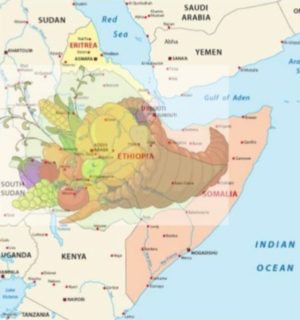
That is plenty of peace.
Plenty of love.
Plenty of respect, appreciation and gratitude.
Plenty of forgiveness and reconciliation.
Plenty of food and clean drinkable water.
Plenty of jobs and opportunities.
Plenty of hospitals, clinic and doctors.
Plenty of modern technology.
Plenty of good will.
Plenty of good leaders.
Plenty of…
Medemer: All for one and one for all in the Horn of Africa!
(to be continued…)

